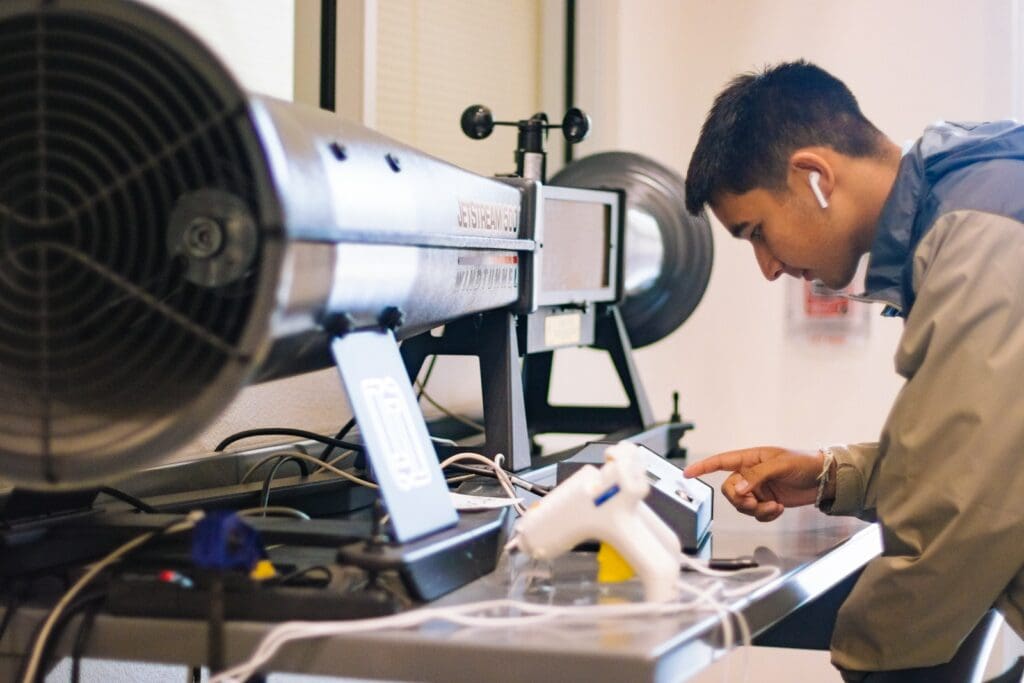This post was originally published on this site

STEM-focused private schools have emerged as an effective solution to prepare students for the challenges and opportunities available in the fields of science, technology, engineering, and mathematics (STEM). By providing a strong foundation in these disciplines from an early age, these institutions cater to the increasing need for well-rounded, skilled professionals in an ever-evolving global economy. Young learners in PK-12 education can benefit from a curriculum that combines the core STEM subjects with critical thinking, problem-solving, and collaboration, enabling them to excel in their future careers.
A unique strength of STEM-focused private schools is their ability to customize their curriculum and teaching methodologies in alignment with the latest innovations and best practices in the field. These schools emphasize experiential, hands-on learning experiences that foster deep understanding and enthusiasm for STEM subjects. This immersive educational approach ensures students develop a solid foundation in these essential disciplines, while also enhancing essential real-world skills such as teamwork, communication, and resilience.
Key Takeaways
- STEM-focused private schools provide comprehensive education in science, technology, engineering, and mathematics, preparing students for a diverse range of careers.
- A key feature of such schools is the emphasis on experiential, hands-on learning, which fosters not only subject proficiency, but also critical thinking and problem-solving skills.
- Women and minority representation in STEM fields can be improved by these specialized educational environments that encourage diverse student engagement and support academic and personal growth.
Understanding STEM-Focused Private Schools
STEM-focused private schools prioritize education in science, technology, engineering, and math for students in Pre-Kindergarten through 12th grade. These schools emphasize a holistic approach to learning, incorporating various aspects of STEM fields into their curriculum. By integrating science, math, technology, and engineering topics, students develop a strong foundation in these critical areas, fostering innovation and promoting future success in STEM-related careers.
A key element of STEM education in private schools is the implementation of a literacy-rich environment. Teachers provide ample resources and support for students to engage in reading and writing within the context of STEM subjects. This enables students to not only gain proficiency in the technical aspects of STEM fields but also to communicate their ideas and understanding effectively.
Additionally, STEM-focused private schools are renowned for their emphasis on innovative teaching methods. Educators at these institutions receive ongoing professional development and resources to stay current with the latest trends in STEM education. Teachers are equipped with modern tools and technology to enhance the educational experience for their students. Innovative teaching techniques such as project-based learning, hands-on lab experiences, and real-world applications are frequently employed in these schools’ instructional practices.
The curriculum at STEM-focused private schools incorporates a wide range of subjects in addition to the core STEM fields. These may include computer programming, design thinking, and robotics, among others. By offering a diverse array of courses, students are exposed to various facets of STEM education, allowing them to discover and hone their individual strengths and interests.
In summary, STEM-focused private schools for Pre-Kindergarten through 12th-grade students endeavor to provide a comprehensive and rigorous education in science, technology, engineering, and math. By fostering literacy, employing innovative teaching methods, and offering diverse curricular options, these institutions aim to position their students at the forefront of the ever-evolving fields of STEM.
Unique Aspects of STEM-Private School Curriculum
STEM-focused private schools offer a unique curriculum that integrates science, technology, engineering, and mathematics (STEM) education, fostering a comprehensive learning environment for PK-12 students. These specialized schools place a strong emphasis on developing essential STEM skills, such as problem-solving, critical thinking, and creativity.
Hands-on learning experiences are a hallmark of STEM-private school curriculums. One popular approach is incorporating robotics and technology education into the classroom, which not only introduces students to programming and engineering concepts but also enhances their ability to work collaboratively. This hands-on, experiential learning allows students to actively engage with complex STEM concepts and apply them in real-world scenarios.
Math and science form the core foundation of STEM education; however, STEM-private schools expand beyond these traditional subjects. Integration of English Language Arts (ELA) and other disciplines, like social studies and arts, provide students with a well-rounded education and contribute to the development of essential communication skills.
Information technology, computer science, coding, and data science are crucial components of a STEM-focused curriculum. By exposing students to these disciplines, students are prepared to excel in an increasingly technology-driven world. Another essential area of instruction is cybersecurity, which equips students with the skills and knowledge needed to navigate the digital landscape safely and responsibly.
STEM-private schools also emphasize real-world applications. They often provide students with opportunities to explore disciplines such as environmental science, manufacturing, and energy management. By fostering an understanding of these areas, students can make informed decisions about potential career paths and contribute positively to industry and society.
In summary, STEM-focused private school curriculums offer a holistic and comprehensive approach to education. By integrating a wide array of disciplines and providing hands-on learning experiences, these schools cultivate confident, knowledgeable, and well-rounded students ready to face the challenges of the modern world.
Role of Teachers in STEM Education
Teachers play a critical role in the success of STEM-focused private schools for PK-12 education. They are responsible for creating an engaging environment that fosters curiosity, creativity, and critical thinking skills among students. In order to effectively teach STEM subjects, teachers need to be well-versed in their respective disciplines and adopt effective teaching strategies and best practices.
One essential aspect of a successful STEM education is the integration of science, technology, engineering, and mathematics in a cohesive teaching and learning paradigm. This approach allows students to explore the connections between different disciplines and learn how they intersect and complement each other. Teachers are responsible for developing interdisciplinary lessons that incorporate real-world problems and hands-on activities to help students grasp the practical applications of their learning.
Professional development is crucial for teachers in STEM education. They must continually update their knowledge and skills to stay current with advances in technology, pedagogy, and instructional strategies. Participating in workshops, conferences, and peer collaboration opportunities enables them to learn from experts in the field, share ideas, and refine their teaching practices.
Teaching strategies in STEM education should promote active learning, as students learn best when they are actively engaged in the learning process. Methods such as inquiry-based learning, project-based learning, and problem-based learning encourage students to ask questions, collaborate, think critically, and problem-solve. These strategies allow teachers to differentiate instruction and adapt their teaching methods to suit the learning needs of their students, ensuring all students have an opportunity to succeed.
In conclusion, the role of teachers in STEM education is multi-faceted and essential for providing students with a comprehensive and authentic learning experience. By approaching their subjects with an integrated perspective, pursuing professional development opportunities, and implementing innovative teaching strategies, STEM educators are equipped to foster the development of the next generation of critical thinkers and problem solvers.
Benefits of STEM Private Schools
Improved Literacy and Numeracy
STEM-focused private schools place a strong emphasis on developing literacy and numeracy skills in students, preparing them for careers in science, technology, engineering, and mathematics. By incorporating math and science into a comprehensive college preparatory curriculum, these schools foster an early understanding of essential STEM concepts. As a result, students gain a strong foundation in these subjects, helping them excel academically and prepare for future STEM careers.
Hands-On Learning
One of the key components of STEM education at private schools is the focus on hands-on learning experiences. Students are given the opportunity to engage in practical projects, learn through experimentation, and collaborate with their peers on individual as well as group projects. This approach allows students to develop critical thinking and problem-solving skills, encouraging them to innovate independently and become more effective learners.
Career Pathways
Private schools that prioritize STEM education foster a strong connection between classroom learning and potential career pathways. By exposing students to various STEM careers and real-world applications of STEM skills early in their education, the schools help students better understand the significance of the subjects they learn and how they can translate their knowledge into future job opportunities. Moreover, such schools also emphasize the importance of a diverse STEM-educated workforce, promoting equal opportunities for all students to pursue a successful career in STEM fields.
Assessments and Academic Performance
STEM-focused private schools prioritize science, technology, engineering, and mathematics education for students in PreK-12. These institutions often have rigorous academic standards and competitive admissions processes. One of the ways to measure the effectiveness of these schools is by examining their students’ performance on standardized assessments and college entrance exams, such as the SAT and ACT.
Many STEM-focused private schools have notable success in preparing students for higher education. This is evident in their students’ strong SAT or ACT scores. These schools often offer advanced courses in math and science subjects, which directly contribute to the development of essential problem-solving and critical-thinking skills required for excellent performance in the assessments.
Integrating hands-on, project-based learning experiences plays a significant role in improving student academic performance in STEM-focused private schools. These experiences enable students to develop a deeper understanding of the subjects, making them better equipped for standardized assessments. Additionally, these schools often have smaller class sizes and personalized learning approaches, allowing educators to identify and address each student’s areas of struggle more effectively. As a result, students show better academic growth and increased success on assessments.
Furthermore, STEM-focused private schools emphasize college and career readiness for their students. This is accomplished by providing resources, such as school counselors and college admissions workshops, that help students navigate the application and financial aid processes. High levels of support in these areas, combined with the rigorous academic curriculum, position students for success in both college entrance exams and their future academic pursuits.
In conclusion, STEM-focused private schools have a vital role to play in preparing students for academic success and career opportunities in the rapidly growing STEM fields. Their focus on comprehensive STEM education, personalized learning experiences, and college and career readiness, translate to higher performance on assessments like the SAT and ACT, setting their students on a path for success.
Adapting to Innovations and Current Events
STEM-focused private schools are consistently adapting to innovations and current events to provide the best education for PK-12 students. They recognize the importance of technology in the classroom and strive to ensure that it is a fundamental component of their curriculum. These schools integrate technology through the use of interactive, data-driven digital tools, virtual simulations, and project-based activities that improve the learning process and cater to individual student needs.
In the face of an everchanging world, STEM-focused private schools prioritize innovation as an essential component of their curriculum. By incorporating research findings and collaborating with experts, these schools are able to stay at the forefront of subject matter advancements. Through the use of project-based learning and multidisciplinary approaches, students are encouraged to develop critical thinking and problem-solving skills, which are necessary tools to succeed in the 21st-century workforce.
The COVID-19 pandemic has posed unprecedented challenges for educational institutions worldwide. Adapting to these challenges, STEM-focused private schools have turned to remote learning strategies to ensure students continue to receive quality education through online platforms and video conferencing technologies. Online course materials have been updated to reflect the current environment, and instructors have undergone additional training to effectively facilitate learning in a virtual setting.
As future research unveils new findings and the world experiences ongoing changes, STEM-focused private schools remain committed to evolving alongside these developments. By adapting to innovation and current events, they ensure that PK-12 students are equipped with the knowledge and skills necessary to navigate the complexities of science, technology, engineering, and mathematics fields successfully.
Finance and Support
STEM-focused private schools for PK-12 education aim to enhance learning experiences and prepare students for future opportunities in science, technology, engineering, and math fields. They require financial support to provide advanced learning resources and skilled instructors. There are several ways to obtain finance and support for these schools.
Governmental funding is available through the U.S. Department of Education, which promotes equity & belonging through STEM education. This includes funding for schools that prioritize diversity and inclusivity. Schools with a high percentage of low-income students can also benefit from Title I funding, aimed at providing resources to improve academic achievement and bridge educational gaps.
Private schools can further explore STEM grants provided by organizations like Project Lead The Way (PLTW). PLTW offers guidance on securing grants and funding opportunities to support STEM initiatives and curriculum implementation. Additionally, schools can collaborate with businesses and industries interested in investing in STEM education to address workforce needs, engaging them as sponsors or partners.
The National Science Foundation (NSF) is a valuable resource for preK-12 STEM education. NSF supports efforts to enhance learning and teaching in STEM fields by providing funding opportunities for curriculum development, teacher training, and learning materials.
To make the most out of their financial resources, STEM-focused private schools should leverage a combination of governmental funding, grants, and private investments. By doing so, they can ensure continued growth and success, while offering students the best possible opportunities to excel in the world of STEM.
Preparing for College and Careers with STEM Private Schools
STEM-focused private schools offer a well-rounded and specialized education, providing students with a strong foundation in science, technology, engineering, and mathematics. These schools often emphasize college and career readiness, ensuring that students are prepared to excel in their chosen College of Engineering or similar post-secondary institutions.
One way that STEM private schools prepare students for college is by offering challenging coursework, such as college-level courses, AP courses, or dual enrollment opportunities. AP courses enable students to earn college credits while still in high school, and dual enrollment allows them to take college classes alongside their high school curriculum. These advanced courses not only help students gain a deeper understanding of STEM subjects but also give them a competitive edge when applying to colleges and universities.
In addition to rigorous academics, STEM private schools often provide students with robust career guidance and resources, allowing them to explore various STEM careers early on in their educational journey. This exploration can include access to up-to-date career information, job shadowing opportunities, and internships, which help students make informed decisions about their future career pathways.
Furthermore, students often participate in hands-on learning experiences, such as laboratory experiments, research projects, and team-based activities, which allow them to develop crucial problem-solving, critical thinking, and collaboration skills. These skills not only prepare them for success in college-level courses but also equip them with the expertise needed to excel in their future STEM careers.
In conclusion, attending a STEM-focused private school can greatly enhance a student’s PK-12 education, equipping them with the knowledge, skills, and experiences needed to thrive in college and their chosen STEM careers. From advanced coursework to career exploration and hands-on learning opportunities, these schools provide a comprehensive and engaging educational experience that empowers students to reach their full potential.
Women and Minorities in STEM
The underrepresentation of women and minorities in STEM fields has been a long-standing issue, but recent efforts aim to improve diversity and inclusion. Expanding access to STEM-focused private schools for pre-kindergarten to grade 12 education could be a useful step in closing the gap.
Inclusive STEM-focused high schools (ISHS) have been created to provide underrepresented minority and female students with greater opportunities to pursue STEM education. These schools often focus on hands-on, project-based learning and real-world applications, making STEM subjects more accessible and engaging for all students. By exposing minority and female students to STEM fields at an early age, these schools hope to spark their interest and encourage them to continue pursuing STEM education and careers.
There are numerous private schools that emphasize STEM education, providing resources, and opportunities for students who are passionate about science, technology, engineering, and math (U.S. Department of Education). Many of these schools are making concerted efforts to recruit and retain more female and minority students, aiming to create inclusive environments that promote diversity and gender equality.
It is important to note that advancing women of color in STEM fields is not only an issue of representation and fairness, but it is also crucial for maintaining US global competitiveness (Sage Journals). A diverse workforce, incorporating varying backgrounds and perspectives, drives innovation and fosters creative problem-solving.
The White House has released a guide on best practices for diversity and inclusion in STEM education and research by and for federal agencies. This guide presents recommendations on recruiting, retaining, and advancing historically underrepresented groups in STEM, including women and minorities.
In summary, promoting diversity in STEM-focused private schools is essential for both social equity and the nation’s global competitiveness. Efforts to improve representation of women and minorities in STEM fields through PK-12 education have the potential to make a significant impact on the future workforce, and the growth of inclusive STEM-focused schools is a notable step in that direction.
Conclusion
STEM-focused private schools offer an enhanced learning experience for PK-12 students by emphasizing science, technology, engineering, and mathematics. Through quality STEM education, students learn critical thinking, problem-solving, and teamwork skills in a collaborative environment.
Parents who choose a STEM private school for their children can expect a curriculum that integrates the four STEM disciplines into interdisciplinary units. This real-world applications approach prepares students for the challenges and opportunities of the 21st-century workforce.
Various STEM activities and competitions offered in these schools encourage students to apply their skills beyond the classroom. Moreover, well-trained educators, dedicated to integrating STEM concepts, foster a positive learning atmosphere.
As a result, students at STEM-focused private schools develop a strong foundation in their respective disciplines. They also get well-equipped for future academic and professional successes. With both short-term and long-term advantages, STEM-focused private schools present a valuable option for PK-12 education.



